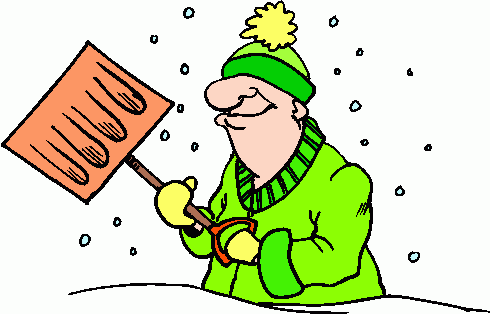Let it Snow (Just not in the Commons)
If you live in the northern stretches of the United States, the winter season brings the distinct possibility of shorter days, colder temperatures, and snow. And with snow also comes the possibility of snowmen, snow angels, snowball fights, white Christmases and so on. But there is also a downside to all this white beauty, the annoying need to cleanup afterwards. However, there is a way to even turn what is typically a boring and even exhausting job into a good reflection on the role that incentives play in the behavior of an individual in an economy. This observation doesn't come from a profound and deep analysis of the impact of meteorology on productivity but was a direct consequence of too much snow and not enough shovelers.
A particularly bad fall covered the area in which I live under 6 or 7 inches of very heavy, very wet snow. The kind of snow that rips branches from their tree and splits trunks in two. The kind of snow that makes roofs creak under the strain, even the steeply pitched ones. The kind of snow that paralyzes governments and strands motorists on highways and byways.
Needless to say, that after the snow had stopped falling and the trees stopped breaking under the strain and the cars stopped being buried came the requisite plowing and shoveling. And the hours wore on as I unearthed (unsnowed?) the walk up to my front door and the sidewalk in front of my house and my driveway and even the four feet of the street in front of it, where the plow truck created a picturesque icy speed bump, presumably to add some excitement in what was otherwise an uneventful day. During those hours I had a long opportunity to consider just what made me and all the other guys on my street motivated enough to do this wearisome and thankless job.
Of course, there are ordinances, regulations, and laws that require homeowners to clear their property, but I doubt that was the primary motivation or even a motivation at all. At least in my case, and I am willing to hazard in the case of my neighbors as well, the motivation was one of house and civic pride. We love and care for our properties. We have skin in the game. It was in the best interest of each household to clean up.
As a result, all the sidewalks of my development, from every bit that hugs the perimeter and to every bit that snake its way through every interior road was clear of snow within 6 hours after the last flake drifted to the ground. Normal life resumed and any resident could walk from one end to the other free of cold, white impediments. Our common areas were collectively free because each of us owned a little slice.
This outcome is in stark contrast to my experiences living in an apartment complex in a nearby town. The apartment complex was big enough that probably the same amount of or more people lived there than all the single family homes where I am now. And the common area was certainly smaller in terms of sidewalks and paths. Nonetheless, almost every resident waited on the landlord’s management company to remove the snow. As a result, apartment dwellers would often be snow bound for a day or more compared to the much more rapid dig out on the order of two to four hours for the home dwellers.
Of course, this snow phenomenon is not new. Economists often talk about how well-constructed incentives motivate people to perform above and beyond what they would do otherwise. For example, endangered species (e.g. rhinoceroses) are better protected from poaching when someone owns the animals rather than just allowing them to be shielded by common protection. The outcomes are better when people have skin in the game. And the ‘skin’ need not even be financially based. Sometimes the incentive takes a more intangible form like the recognition for civic pride that is used to motivate companies to ‘own’ sections of highways that they keep clean.
So, there you have, an economics lesson brought to us by the combination of mother nature and human enlightened self-interest. Who said winters were all bad?

